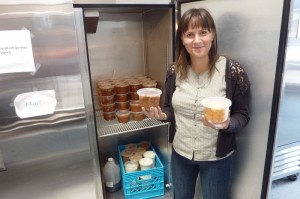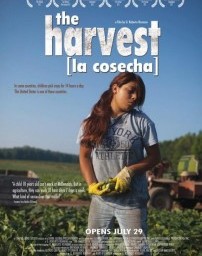After growing up in Nebraska, the land of corn and cattle, I didn’t hear the term “sustainability” until I enrolled at Willamette University in Salem, OR, in 2006. And not until my sophomore year did I really connect the need for sustainability to the food system.

Blog: Food justice
+ Blog Categories

Marching for Justice
- Blog
Proud as I am of Bon Appétit’s contribution to the Coalition of Immokalee Workers’ cause, I’ve long wanted to help in a more personal way. So when Cheryl Queen, vice president of communication and corporate affairs for Compass Group USA, said she was going to accompany them for two days of the two-week march, I immediately said, “I’ll go with you!” with great enthusiasm and not much thought.

The Green Team: Fighting Food Waste, One College at a Time
- Blog
The Bon Appétit Fellows are gearing up for the start of the school year and thanks to our partnership with the Food Recovery Network (FRN) we have some exciting new programs to look forward to.

Reed, Lewis & Clark Colleges Show that a Little Food Goes a Long Way
- Blog
When our chefs at Reed and Lewis & Clark Colleges first sat down with Ava Mikolavich from Urban Gleaners to discuss a food recovery program they were skeptical of how much food they could actually donate. Yet since April, the two cafés have donated a total of more than 5,000 pounds of food!
Still, as Dani Turk from the hunger relief organization Food Life Line once said, “Though it may seem like nothing, one piece of lasagna is still a dinner for a person in need.” So in April, the two schools began donating leftover food that would otherwise go to waste to Urban Gleaners.

BAMCO CEO Joins Food Movement Leaders in Demanding Healthy Food and Farm Bill
Bon Appétit Management Company CEO Fedele Bauccio is proud to be among the 70 leading chefs, authors, food policy experts, nutritionists, CEOs, and environment and health organizations that have today sent an open letter to Congress urging lawmakers to revise the draft of the 2012 Farm Bill — which should more properly called the Food Bill, as it is the largest and most significant piece of legislation affecting what, how, and even whether Americans eat.

Bon Appétit Celebrates 13th Annual National Farmworker Awareness Week
- Blog
As part of our focus on farmworker rights, Bon Appétit Management Company is proud to partner with Student Action with Farmworkers for the 13th annual National Farmworker Awareness Week (NFAW). Running from March 25 – March 31 (César Chávez’s birthday), NFAW aims to raise awareness about the conditions of the men, women, and children who harvest our food and to bring attention to their efforts to secure fair wages and benefits, and to form and join unions.
Celebrating Valentine’s Day with Cordillera Chocolate
- Blog
Bon Appétit celebrated Valentine’s Day last week at American University in Washington, DC, by hosting an event that focused on the best part of this holiday: Chocolate! But not just any old chocolate.

Jacobs Farm Proves that Big Isn’t Bad
- Blog
Jacob’s Farm is 300 acres plus 1 million square feet of greenhouse space filled with wonderfully pungent smells, intensely flavorful tastes, and beautiful, brightly colored flowers. This is one of the largest farms I’ve visited on my travels — and one of the most socially responsible. Jacob’s Farm offers great benefits to its employees: paying more than minimum wage and offering health care, dental care, and a 401(k) plan; and providing paid time off and end-of-year bonuses.

Food Week at Penn Explores Making Fruits and Vegetables Cool
- Blog
The University of Pennsylvania celebrated this year’s National Food Day by kicking off its third annual Food Week: You Are What You Eat, sponsored by Bon Appétit at Penn Dining and supported by Fox Leadership. One of the major goals of Food Week each year is education — raising awareness about food issues in the hopes that awareness will ultimately lead to action.

“Ethically Delicious” Uniforms in time for Fair Trade Month
- Blog
Conscientious consumers rely on third-party-certified labeling programs such as organic, which reassures us that those products were grown without toxic pesticides or using genetically engineered seeds, and Certified Humane, which tells us that the animals we’re eating were raised ethically. But neither of those labels tells us anything about how the people behind the products were treated. That’s why the Fair Trade Certified™ label is so important. October is Fair Trade month, and we at Bon Appétit Management Company are proud to have partnered with Fair Trade USA to help raise awareness.
